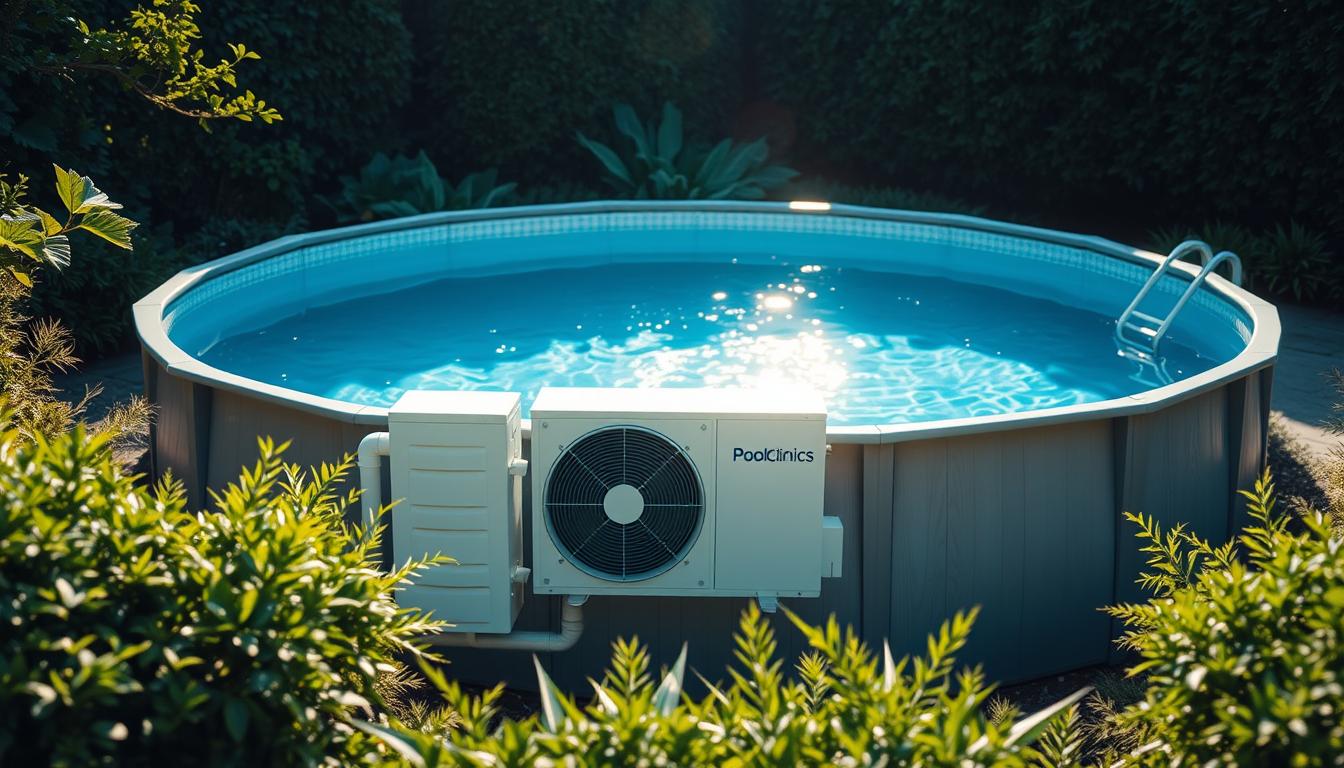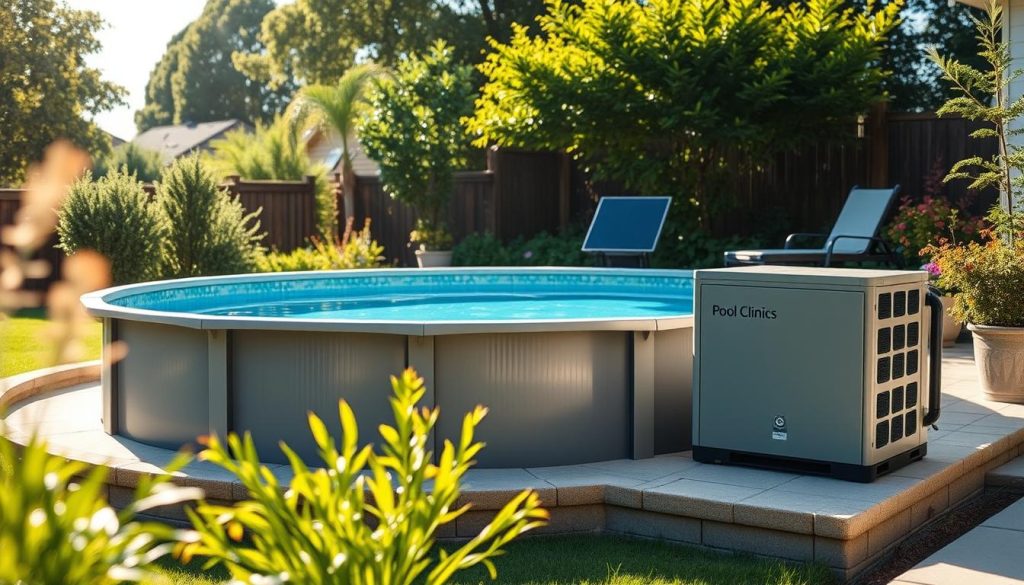
Pool owners dream of year-round swimming fun. Energy-efficient pool heat pumps can make this a reality. These eco-friendly devices extend your swimming season and keep your pool comfortably warm.
Heat pumps offer a green solution for above ground pool heating. They provide refreshing dips in your backyard oasis whenever you desire.
Pool heat pumps capture warmth from the air around them. They transfer this heat to your pool water. This clever tech ensures a pleasant swim while cutting energy costs.
These pumps work well for fresh and saltwater pools. They’re great for both above ground and in-ground setups.
Madimack’s InverELITE V2 series leads in energy-efficient pool heating. These pumps boast a titanium heat exchanger and advanced inverter technology. They promise top quality and big energy savings.
Eco-friendly heat pumps extend your swimming season. They also reduce your carbon footprint and lower energy bills. It’s a smart investment for above ground pool owners.
Key Takeaways
- Pool heat pumps offer an energy-efficient and eco-friendly solution for heating above ground pools
- By using heat from the surrounding air, pool heat pumps can significantly reduce energy costs compared to gas heaters
- These versatile heat pumps are suitable for both fresh and saltwater pools, as well as above ground and in-ground setups
- Madimack’s InverELITE V2 series pool heat pumps feature a titanium heat exchanger and inverter technology for high quality and energy savings
- Investing in an energy-efficient pool heat pump allows pool owners to extend their swimming season while minimizing environmental impact and lowering energy bills
Understanding Swimming Pool Heat Pumps
Swimming pool heat pumps extend your swimming season and provide a cozy experience. They extract heat from the air and transfer it to the pool water. This raises the water temperature to your desired level.
These devices are energy-efficient and cost-effective. Let’s explore how they work and their benefits.

How Pool Heat Pumps Work
Pool heat pumps use a simple yet effective process. A fan draws in outside air and directs it to an evaporator coil. The coil contains a refrigerant that absorbs heat from the air.
The heated refrigerant turns into gas and passes through a compressor. This significantly increases its temperature. The hot gas then enters a heat exchanger.
In the exchanger, the gas transfers heat to the pool water. As it cools, it condenses back into liquid. A thermostat controls this cycle to maintain the desired temperature.
Energy Efficiency and Cost Savings
Pool heat pumps are remarkably energy-efficient. They use ambient air as a renewable energy source, unlike gas heaters that burn fuel. This results in significant energy savings.
| Heat Pump Type | Coefficient of Performance (COP) | Energy Efficiency |
|---|---|---|
| On/Off Heat Pump | 4.5 – 5.0 | Good |
| Semi-Inverter Heat Pump | 5.0 – 5.5 | Better |
| Full Inverter Heat Pump | 5.5 – 6.0 | Best |
The Coefficient of Performance (COP) measures heat pump efficiency. It shows heat output per unit of electricity input. On average, pool heat pumps have a COP of 5.25.
This means they provide 5.25 units of heat for each unit of electricity used. This exceptional efficiency leads to lower operating costs compared to gas heaters.
The initial cost of a heat pump may be higher than a gas heater. However, long-term savings are substantial. Heat pumps operate at a fraction of gas heater costs.
Many manufacturers, like Madimack, use advanced inverter technology. This further enhances energy efficiency and cost savings in their pool heat pumps.
By investing in a pool heat pump, you can significantly reduce your pool heating costs while enjoying a comfortable and extended swimming season.
Factors to Consider When Choosing a Pool Heat Pump
Selecting a pool heat pump involves several key factors. These include pool size, desired temperature, energy efficiency, and durability. Noise level, installation, and maintenance requirements are also important considerations.
Pool Size and Desired Temperature
Pool size and desired water temperature are crucial when choosing a heat pump. The average UK outdoor inground pool is about 75m3 in volume. Heat pumps range from 3.5kW to 32kW in capacity.
Choose a heat pump that can adequately heat your pool. Consider factors like climate and pool usage when making your decision.
Energy Efficiency
Energy efficiency is vital when selecting a pool heat pump. Look for models with a high coefficient of performance (COP) rating. A higher COP means more heat output per unit of electricity consumed.
Electric heat pumps are generally more energy-efficient than gas pool heaters. They offer lower operating costs in the long run.
Durability and Reliability
Consider the build quality and manufacturer’s reputation when investing in a pool heat pump. Choose models made from durable materials that can withstand various weather conditions.
Read customer reviews and seek recommendations to assess different models. A well-built heat pump will provide years of efficient pool heating.
Noise Level
Pool heat pumps can generate noise during operation. Consider the noise level if it’s a concern for you. Look for models with noise-reducing features or quieter compressors.
A quieter pool heat pump ensures a more pleasant swimming experience. This is especially important if your pool is near homes.
Installation and Maintenance
Consider the ease of installation and maintenance requirements of the pool heat pump. Some models need professional installation, while others are DIY-friendly.
Look for features like self-cleaning capabilities or easy access to components. Regular maintenance is crucial for extending the life of your pool heat pump.
Consider contacting professionals like Sunset Pools & Spas for help. They can assist with choosing, installing, and maintaining your pool heating system.
| Pool Heater Type | Pros | Cons |
|---|---|---|
| Gas Pool Heaters | Quick heating time | Higher operational costs and carbon emissions |
| Electric Heat Pumps | Energy-efficient, lower operating costs | Higher upfront costs, less effective in cold weather |
| Solar Pool Heaters | Eco-friendly, minimal operational costs | Dependent on sunlight, requires significant space |
| Electric Pool Heaters | Simple operation, quieter than gas heaters | Struggle in colder climates, high initial costs |
Top Pool Heat Pumps for Above Ground Pools
Choosing the right pool heat pump is crucial for your above ground pool. Energy efficiency, heating capacity, and pool compatibility are key factors to consider. Here’s a list of top-performing heat pumps for various pool sizes.
Energy-Saving Black & Decker Pool Heat Pump 53,000 BTU to Heat 10,000 Gallons
The Black & Decker pool heat pump efficiently warms up to 10,000 gallons of water. Its 53,000 BTU capacity and 6.4 C.O.P. rating significantly reduce energy costs. The unit features a durable, corrosion-resistant titanium evaporator condenser for long-lasting performance.
This heat pump works with fresh and saltwater pools. It operates quietly and has an easy-to-use interface with LED indicators and self-diagnostics.
Energy-Saving Black & Decker Pool Heat Pump 80,000 BTU to Heat 15,000 Gallons
For larger pools, the Black & Decker 80,000 BTU heat pump warms up to 15,000 gallons. Its 6.4 C.O.P. rating ensures significant energy savings and reliable heating performance. The corrosion-resistant titanium evaporator condenser efficiently converts air into heat.
High-efficiency fins enable quick heating in fresh and saltwater pools. This user-friendly pump operates quietly and features an intuitive interface for easy control.
Energy-Saving ComforTemp Pool Heat Pump 32,000 BTU to Heat 7,500 Gallons
The ComforTemp pool heat pump is ideal for pools up to 7,500 gallons. Its 32,000 BTU capacity and corrosion-resistant titanium condenser efficiently capture heat from the air. This saves energy and costs while providing quick heat transfer.
User-friendly controls and a quiet motor ensure a pleasant swimming experience. The ComforTemp pump works with fresh and saltwater pools, offering eco-friendly heating.
| Pool Heat Pump Model | BTU Capacity | Gallons Heated | Pool Type Compatibility |
|---|---|---|---|
| Black & Decker 53,000 BTU | 53,000 | 10,000 | Above Ground, Fresh & Saltwater |
| Black & Decker 80,000 BTU | 80,000 | 15,000 | Above Ground, In-Ground, Fresh & Saltwater |
| ComforTemp 32,000 BTU | 32,000 | 7,500 | Above Ground, In-Ground, Fresh & Saltwater |
Conclusion
Investing in an energy-efficient pool heat pump is a smart choice. It offers financial and environmental benefits for above ground pools. You can reduce heating costs and minimize your carbon footprint while enjoying comfortable swims.
Consider your pool size, desired temperature, and energy efficiency when selecting a heat pump. Look at durability and noise level too. High-quality models like Madimack’s can save up to 90% on heating costs.
Madimack’s pool heat pumps have a COP rating of 14. This shows exceptional energy efficiency. They use renewable energy sources to generate heat.
Switching to an energy-efficient pool heat pump contributes to a greener future. These pumps last 15-20 years with minimal maintenance. It’s a long-term investment that saves money and promotes sustainability.
Explore Madimack’s range of high-quality pool heat pumps for above ground pools. Take the first step towards eco-friendly pool heating today.







